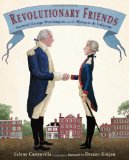
 Revolutionary Friends
Revolutionary FriendsGeneral George Washington and the Marquis de Lafayette
Calkins Creek (Highlights), Honesdale, Pennsylvania, 2013. 40 pages.
Starred Review
This is what a nonfiction picture book should be. It tells a story, complete with flourishes, such as inserting French words in spots. And it also gets in the facts, particularly in the form of pictures of parchment on many pages, with quotations from Lafayette or Washington, talking about the episode featured on that page.
I didn't know much about Marquis de Lafayette. I knew he was important during the American Revolution, but didn't really know why. Now I do. And now I understand his deep friendship with George Washington, which began during the war and extended through the rest of their lives.
The book begins in 1777, when nineteen-year-old Lafayette came to America and introduced himself to General Washington, eager to help. Washington was not so impressed -- at first. Other Frenchmen had come but had held themselves above the Americans and not bothered to learn English.
Lafayette was blissfully unaware of Washington's opinions.
He had adopted the motto cur non -- "why not." Having come this far, why not go further?
Lafayette was anxious to be trained and eager to communicate. He had studied English while on the rough sea.
He adored America. And because Washington represented America, Lafayette idolized him.
Washington approached.
Enchanté!
The commander complimented Lafayette on his noble spirit and the sacrifices he had made. He invited Lafayette to live in his quarters.
Voilà!
To Lafayette, the cementing of their bond was as simple as that.
The book goes on to tell how the Americans were in a tight spot, and Congress wouldn't trust Lafayette with a command. He finally proved himself in a way they couldn't ignore, risking his life at the Battle of Brandywine. Washington told the doctor, "Take charge of him as if he were my son, for I love him with the same affection."
There are several pages of back matter after this ending, the decisive cementing of their friendship. It tells how the friendship continued, gives timelines for both their lives, and even lists places to visit.
The strong point of this book, well supported with the rest, is the accessible story, a story of two men who became friends in a time of war. And changed the world.
